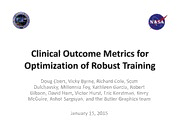
NASA Technical Reports Server (NTRS) 20150001871: Clinical Outcome Metrics for Optimization of Robust Training PDF
Preview NASA Technical Reports Server (NTRS) 20150001871: Clinical Outcome Metrics for Optimization of Robust Training
Clinical Outcome Metrics for Optimization of Robust Training Doug Ebert, Vicky Byrne, Richard Cole, Scott Dulchavsky, Millennia Foy, Kathleen Garcia, Robert Gibson, David Ham, Victor Hurst, Eric Kerstman, Kerry McGuire, Ashot Sargsyan, and the Butler Graphics team January 15, 2015 Project Summary • Funded through the 2013 NASA Research Announcement Human Exploration Research Opportunities (HERO) solicitation – awarded June 2014 as part of NSBRI Smart Medical Systems and Technology Team assignment (NSBRI grant # SMST03801). • The objective of this research is to develop and use clinical outcome metrics and training tools to quantify the differences in performance of a physician vs non‐physician crew medical officer (CMO) analogues during simulations. Map to the Human Research Program Integrated Research Plan • Primary: Exploration Medical Capability (ExMC) “Risk of Unacceptable Health and Mission Outcomes Due to Limitations of In‐flight Medical Capabilities” – ExMC 2.02: We do not know how the inclusion of a physician crew medical officer quantitatively impacts medical risk during exploration missions. • Secondary: Space Human Factors and Habitability Element (SHFE) “Risk of Performance Errors Due to Training Deficiencies”. – SHFE‐TRAIN‐01: How can we develop objective training measures to determine operator proficiency during and after ground training? – SHFE‐TRAIN‐02: How do we develop training methods and tools for space medical application if time is minimal? – SHFE‐TRAIN‐03: How can onboard training systems be designed to address Just‐in‐Time (JIT) and recurrent training needs for nominal and off nominal scenarios? Specific Aims 1. Develop clinical outcome metrics (immediate term) to discriminate between physician and non‐physician CMO analogs. 2. Develop long‐term clinical outcome metrics through modeling of mission impacts due to lack of complete clinical procedure success (Integrated Medical Model). 3. Develop advanced training products that increase retention and reduce errors during the performance of medical procedures. 4. Promote public understanding of human research and human activity in space environments through formal and informal education opportunities. Experimental Design Training/Testing Modules 1. Kidney/urinary ultrasound (diagnostic) with human volunteer "patient“ 2. Fundoscopy (diagnostic) with human volunteer "patient“ 3. Ultrasound guided intravenous access (intervention) with simulated patient (ultrasound phantom‐ arm) 4. Intubation (intervention) with simulated patient (mannequin) 5. Differential diagnosis exercise (software‐based, diagnostic positive control, physicians expected to outperform non‐physicians) Testing Procedures • Training – Didactic and hands‐on – Software tool used for content as well as familiarization • Test and re‐test – Autonomous – Access to software tool and other required resources. – Timed – Live observation and metric recording – Software tool “click tracking” – Quad screen synchronized video recording Timeline • Year 1: IRB approval, software training tool design and production, CME course certification, subject recruitment • Year 2: Initial subject training and baseline simulation testing (all groups), simulation re‐test (Group A‐ 3 months), simulation re‐test (Group B‐ 6 months) • Year 3: simulation re‐test (Group C‐ 12 months), data analysis (including IMM), software tool optimization, final report Research Products • This research will yield the following products: – Data that quantifies differences in medical outcomes when physician and non‐physician CMO analogs are compared in procedure simulations (immediate term outcomes) and by IMM analysis (mission impacts) – Refined clinical outcome metrics for medical training and testing – Innovative medical training products and solutions to maximize CMO performance – Enhanced IMM capability thought the development of algorithms that account for incorrect diagnoses and incomplete treatment – Validation of the methods and products used by this experiment for operational use in the planning, execution, and quality assurance of the exploration mission CMO training process QUESTIONS/DISCUSSION
